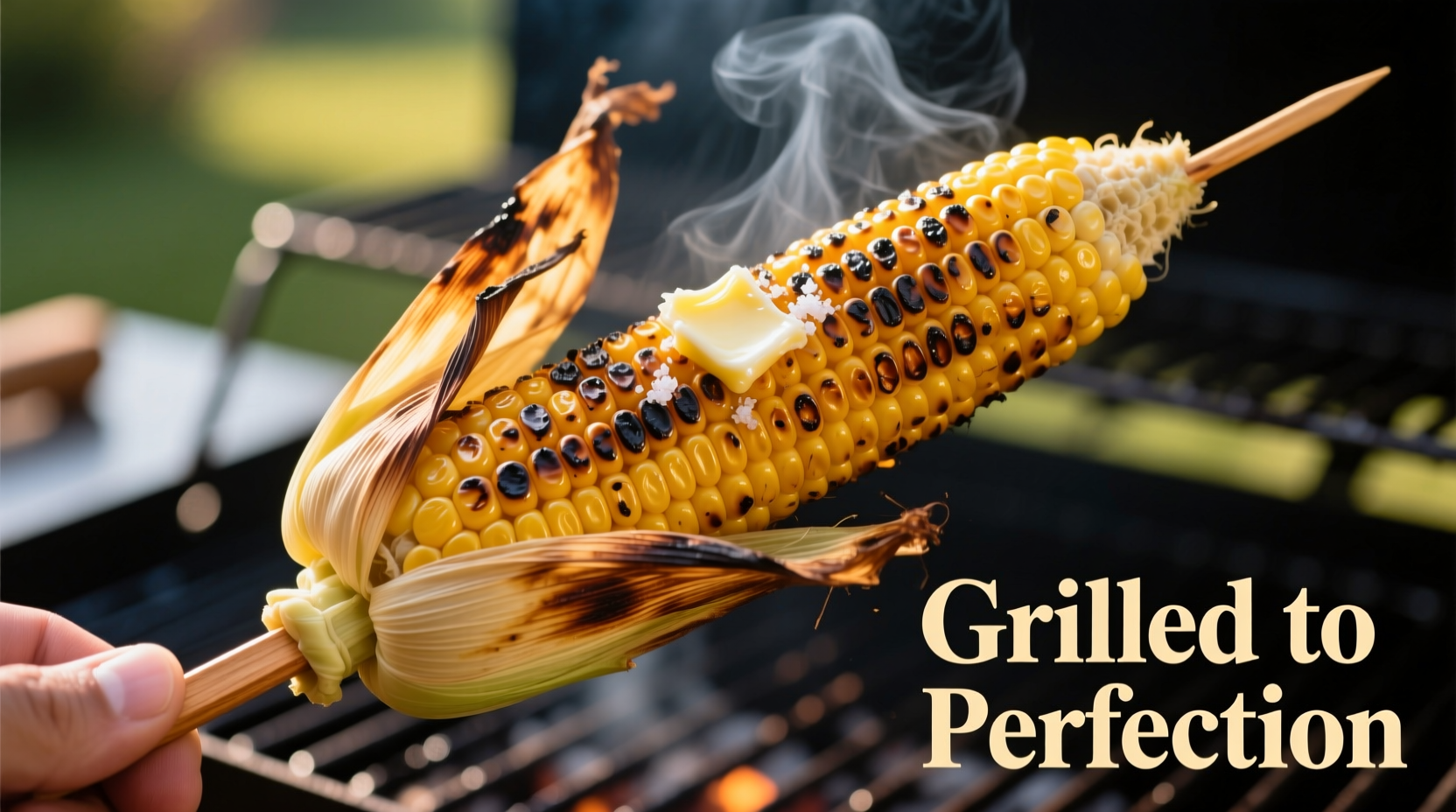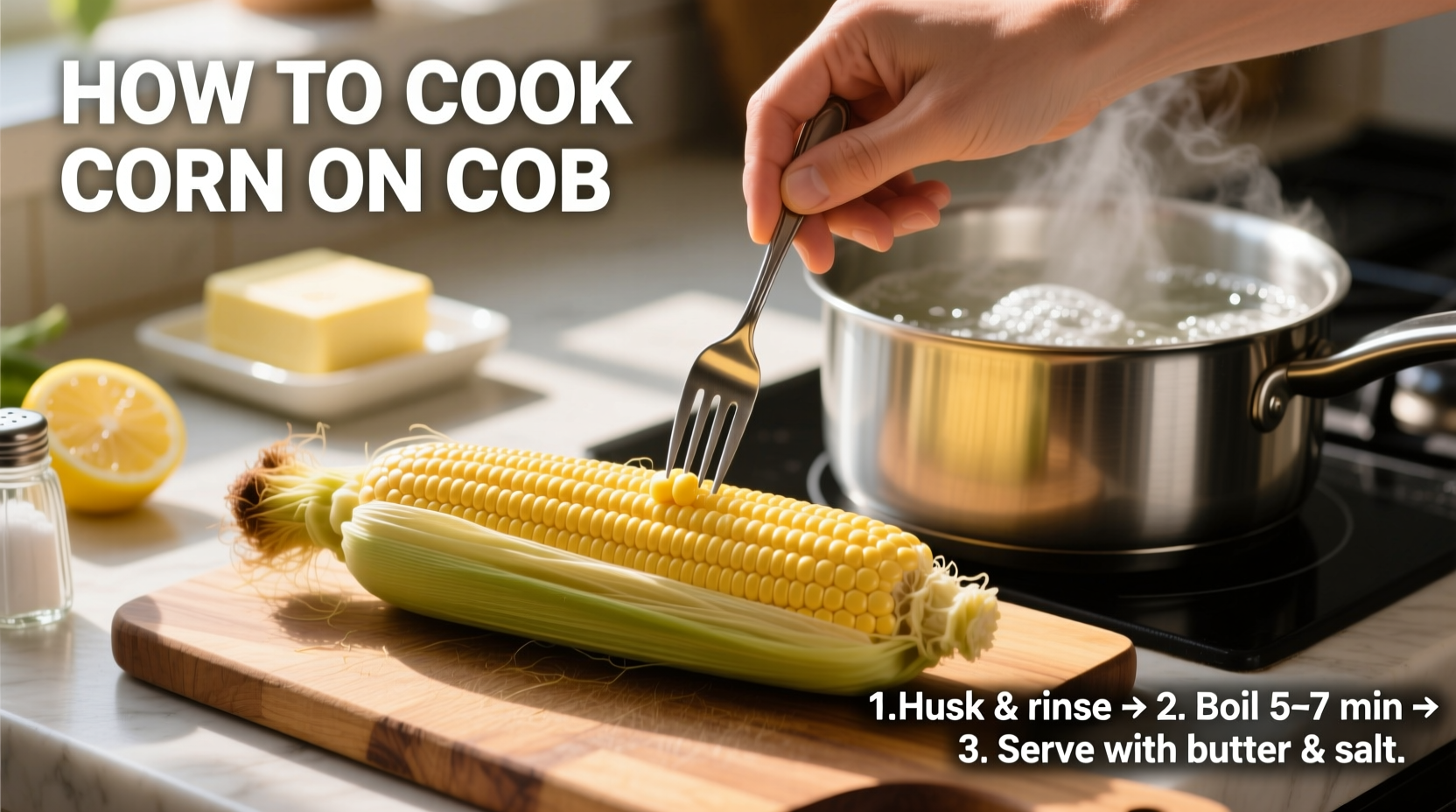The best way to cook corn on cob depends on your method: boil for 5-7 minutes, grill for 15-20 minutes, microwave for 3-4 minutes, or roast in oven for 20-25 minutes. Fresh corn should be cooked within 1-2 days of purchase for optimal sweetness and texture.
Nothing says summer like perfectly cooked corn on cob. Whether you're hosting a backyard barbecue or preparing a simple weeknight dinner, mastering corn preparation transforms this humble vegetable into a standout side dish. This comprehensive guide covers every aspect of cooking corn on cob, from selecting the freshest ears at the market to serving them with creative flavor enhancements.
Selecting the Freshest Corn
Quality starts at the point of purchase. The USDA recommends looking for specific indicators of freshness when choosing corn:
- Tightly wrapped green husks without dryness or yellowing
- Plump, firm kernels visible through the husk
- Moist, green silk strands at the top
- Heavy weight for size, indicating plump kernels
Corn begins converting sugars to starch immediately after harvest, so freshness matters. According to Cornell University's agricultural extension, corn loses up to 50% of its sugar content within 24 hours at room temperature. For best results, purchase corn the same day you plan to cook it, or store it in the refrigerator with husks intact.
Preparation Essentials
Proper preparation sets the stage for perfect cooking:
- Leave husks on until ready to cook to preserve moisture
- Remove husks and silk just before cooking
- Soak corn in cold water for 15-30 minutes before grilling (optional but recommended)
- Trim any uneven ends for stability during cooking
Cooking Method Comparison
| Method | Cooking Time | Equipment Needed | Best For |
|---|---|---|---|
| Boiling | 5-7 minutes | Pot, water, stove | Quick weeknight meals, large batches |
| Grilling | 15-20 minutes | Charcoal/gas grill | Summer barbecues, smoky flavor lovers |
| Microwaving | 3-4 minutes | Microwave, paper towel | Single servings, minimal cleanup |
| Oven Roasting | 20-25 minutes | Baking sheet, oven | Indoor cooking, consistent results |
Step-by-Step Cooking Instructions
Boiling Corn on the Cob
Boiling remains the most traditional method for cooking corn:
- Bring a large pot of water to a rolling boil
- Remove husks and silk from corn
- Submerge corn in boiling water
- Cook for 5-7 minutes (do not add salt, which can toughen kernels)
- Remove with tongs and serve immediately
For enhanced flavor, add 1-2 tablespoons of sugar to the water. Avoid overcooking, as this causes kernels to become tough and lose sweetness.
Grilling Corn on the Cob
Grilling creates delicious caramelized spots and smoky flavor:
- Preheat grill to medium-high (375-400°F)
- Remove husks and silk, then brush with oil
- Place corn directly on grill grates
- Cook for 15-20 minutes, turning every 5 minutes
- Remove when kernels show light char marks
For a more traditional approach, leave husks on, remove silk, and soak corn in water for 30 minutes before grilling. The husks protect the corn while creating a steaming effect.
Microwave Method for Single Servings
The microwave offers the quickest cooking method with minimal cleanup:
- Leave husk intact
- Cut off silks protruding from top
- Wrap ear in damp paper towel
- Microwave on high for 3-4 minutes per ear
- Carefully remove husk (steam will be hot)
This method preserves maximum nutrients and requires no added water, keeping flavors concentrated.
Oven Roasting Technique
When outdoor grilling isn't possible, oven roasting delivers excellent results:
- Preheat oven to 400°F
- Remove husks and silk
- Brush corn with oil or melted butter
- Place on baking sheet
- Rent for 20-25 minutes, turning halfway through
Serving Suggestions and Flavor Enhancements
Elevate your corn with these professional chef-recommended techniques:
- Classic butter blend: Mix softened butter with minced garlic and fresh herbs
- Mexican street corn style: Coat with mayonnaise, cotija cheese, chili powder, and lime juice
- Herb-infused oils: Drizzle with basil, cilantro, or dill oil for fresh flavor
- Cheese alternatives: Try feta, parmesan, or nutritional yeast for dairy-free options
For those with dietary restrictions, corn naturally provides 10% of your daily fiber needs and contains valuable antioxidants. The American Heart Association recognizes corn as part of a heart-healthy diet when prepared without excessive butter or salt.

Troubleshooting Common Corn Cooking Issues
Even experienced cooks encounter these common problems:
- Tough kernels: Result of overcooking or old corn. Stick to recommended times and use fresh corn.
- Dry corn: Caused by removing husks too early. Keep husks on until cooking begins.
- Uneven cooking: Turn corn regularly during grilling or roasting for even exposure.
- Difficulty removing silk: Soak corn in water for 10 minutes before husking to loosen silk.
Food safety is crucial when handling corn. The FDA recommends cooking corn to an internal temperature of 160°F (71°C) to ensure safety while maintaining optimal texture. Never leave cooked corn at room temperature for more than two hours to prevent bacterial growth.
Storing Leftover Corn
Proper storage extends corn's shelf life:
- Refrigerate cooked corn in airtight container for 3-5 days
- Freeze cooked kernels for up to 12 months
- Store uncooked corn in refrigerator with husks intact for 1-2 days
- Do not store corn near apples or other ethylene-producing fruits
Frequently Asked Questions
How long does fresh corn last in the refrigerator?
Fresh corn with husks intact lasts 1-2 days in the refrigerator. For extended freshness, store corn in a plastic bag with a damp paper towel. Cooked corn stays fresh for 3-5 days when stored in an airtight container.
Should I add salt when boiling corn?
No, adding salt to boiling water can toughen corn kernels. Instead, add 1-2 tablespoons of sugar to enhance natural sweetness. Season with salt after cooking for best texture and flavor.
Can I freeze corn on the cob?
Yes, freeze corn either cooked or raw. For raw corn, remove husks and silk, then wrap tightly in plastic wrap and place in freezer bags. For cooked corn, cool completely before freezing. Properly frozen corn maintains quality for 10-12 months.
Why does my corn become tough when I cook it?
Corn becomes tough primarily from overcooking or using corn that's no longer fresh. Stick to recommended cooking times (5-7 minutes for boiling), and use corn within 1-2 days of purchase. Older corn naturally converts sugars to starch, resulting in tougher texture regardless of cooking method.











 浙公网安备
33010002000092号
浙公网安备
33010002000092号 浙B2-20120091-4
浙B2-20120091-4